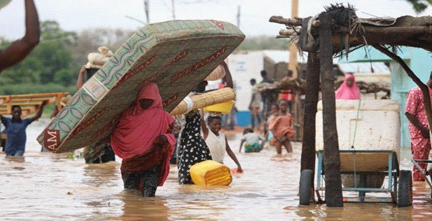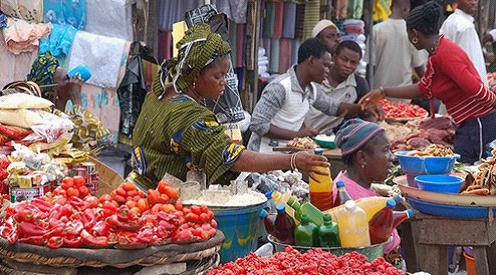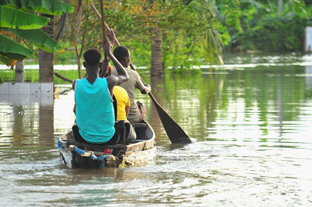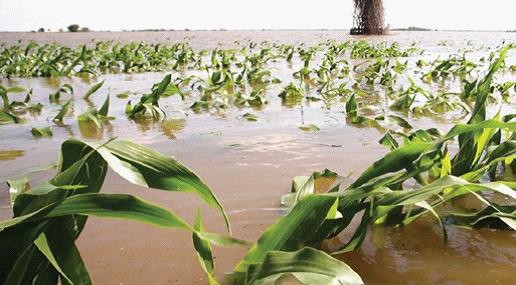BY EDNA EMENI/OGOROAMAKA AMOS/ AMAYINDI YAKUBU/JUDITH OBIANUA
WITH the intensity of the rains in the past few months, reports of flooding ravaging farmlands across some states in Nigeria have begun to filter in.
Despite the flood alerts from the Nigerian Hydrological Services Agency (NIHSA), the situation has not abated, thus, forcing farmers to rethink planting and harvesting calendars.
And with the water levels poised to breach riverbanks along the Niger and Benue rivers, many farmers are faced with the stark choice between losing an entire season’s farm work and premature harvest and selling off their farm produce at giveaway prices.
It is for this reason that The Pointer team reached out to some farmers, traders and consumers to find out the effects of the flood and it’s possible consequences on food supply chain this year.
In The North: Flood, Threatening Food Supply.
“Our find showed that, in Yola, Adamawa State, the impact of the flooding is already carving deep scars into the lives and livelihood of farmers, thus posing a threat to food supply.
Victor Danladi, a local from Yola Town, recounted the destruction in Sagari Phase Two, a community under the Yola Town Local Government Area. “The flooding affected lives, properties, and farmlands,” he said, his voice heavy with concern. “There were reports of people who lost their lives, and many homes and farms were destroyed.”
According to him, the damage went beyond what the eye could immediately see. “There are videos and photos of maize and rice farms that have been completely uprooted and swept away by flood.” Interestingly, he said the flood was not triggered by rainfall but by mining activities near Yola South. “I think it was caused by the mining site. That’s what I heard,” he added.
He said the consequences have been devastating for local farmers, many of whom rely solely on agriculture for survival. “Farming is our major occupation here,” Victor said. “People who rely on farming to feed, to survive, and to earn a living and take care of themselves, now are just dejected because their major source of income and livelihood have been swept away as a result of the flooding”.
Another farmer, Salisu Abdulla said, ”The flooding has added salt to our farmers’ wounds. He described the flooding crisis in Nigeria as a decade-old calamity that has continues to wreak havoc on the same vulnerable regions year after year. “Flooding is not new, it has been recurring in almost the same areas for decades, affecting farmlands, livelihoods, and lives,” he said.
He regretted that the worst-hit victims are rural farmers, many of who are already economically fragile. “They are not weak in body and mind. They have also been made financially unstable because of the flood.
Lamenting, he said, “This years rainy season has deepened our crisis as farmers. While we expect relief from irrigation fuel costs, the flood has destroyed our crops, and fertiliser prices have skyrocketed, making it difficult for smallholder-farmers to sustain their farming activities. “A 50 kg bag of fertiliser, whether NPK, Urea or Indorama, is simply unaffordable now,” he said, lamenting that many farmers have no choice but to harvest prematurely to avoid losing everything.
“This flood is like adding salt to injury,” he said grimly. Beyond the climate impacts, Abdullah called attention to the economic ripple effects, especially since food prices have dropped sharply due to recent government policy interventions. “From late 2024 to mid-2025, the price of local rice, maize, and beans has fallen by over 15%,” he said. But this crash, he argued, benefits consumers at the direct expense of farmers, who now struggle to recoup their investments.
“How can you plant, fertilise, hire labour, and then not even earn back your capital?” he asked.He warned that this dangerous cycle not only threatens food security but also contributes to rising insecurity. “If farmers lose their livelihoods, we’ll have more jobless youth, more out-of-school children, especially in the North and eventually more insecurity,” Abdullah said.
“Northern Nigeria produces most of our food, but it also has the highest number of out-of-school children. The link is clear.”
To avoid future catastrophe, Abdullah called for a three-tier plan short-term, medium-term, and long-term interventions. In the immediate term, he urged the government to stock food banks, subsidize dry-season farming, and provide urgent financial support to farmers. Long-term, he emphasised the need to make agriculture a year-round, 12-months occupation, rather than a seasonal scramble dictated by rainfall. He also pushed for the establishment of a national agricultural insurance policy. “We need farm insurance in Nigeria desperately,” he said.

“If farmers knew they could recover even part of their losses, they’d be more confident and motivated to continue. It would make agriculture more lucrative and less risky.”
He urged the Federal Ministry of Agriculture to act decisively. “Floods may be natural, but the suffering doesn’t have to be. If the government intervenes wisely through insurance, infrastructure, and real support, we can turn this tide.”
In Delta State: Farmers Express Fear Of Losing Crops, Fish Ponds
At the popular Ogbeogonogo Market in Asaba, the Delta State capital, a trader in foodstuffs, Usman Abubakar said, rice dealers in the Market have peeled back the curtain on shifting grain prices as they brace for seasonal floods and early-harvest gluts.
According to him, “Mango rice that sold for ninety thousand naira (₦90,000) per bag is now eighty-six thousand naira (₦86,000), while Optimum rice has slumped from eighty thousand naira to seventy thousand naira per bag. Beans, too, have softened. What once went for two hundred thousand naira per bag now fetches one hundred and seventy thousand naira.
Prices of other food items, he said, have remained steady for now, but prices are generally dropping, and we hope the trend continues until December.”
Speaking with Mrs Nwaka, a seed-tomato and fresh-pepper seller in the same market, revealed a very different story for perishables. She said, “The prizes of seeded tomatoes such as Jos and Cameroon varieties are still on the high side,” she said. “A small basket of seed tomatoes goes for two hundred and fifty thousand naira (₦250,000), and big baskets won’t return until December. Native tomatoes, those grown locally, are somewhat cheaper at forty-one thousand naira (₦41,000) per basket, but overall costs remain inflated because transporters from the North fear ambush by herders and are reluctant to deliver loads”.

”Another trader, Mrs Grace Meduah, explained that the prize of garri has continued to swing unpredictably. “Garri doesn’t have a fixed price, it varies,” she noted. “Red garri used to be forty-seven thousand naira (₦47,000) per bag, and white garri the forty thousand naira (₦40,000). Now, white garri can drop to thirty-five thousand naira (₦35,000), but sometimes it climbs back up. If this depreciation continues, it will hurt farmers here since cassava is our major produce.
Also at the Cable Market, Mrs Mary Onochie, a yam seller, described peak-season dynamics that keep tuber prices elevated. “Yam remains expensive because it’s in season,” she said. “A large old yam tuber sells for five to six thousand naira (₦5,000–₦6,000) and small ones for about two thousand five hundred naira (₦2,500). New yams start at one thousand naira (₦1,000) for small sizes, but large new yams command prices similar to old ones. We expect more new yams by next month, which may ease prices, but I don’t think it will hurt farmers produce.
At Uzere and Araya in Isoko South Local Government Area of Delta State, a telephone call to some of the farmers revealed that, many farmers, in view of the anticipated flooding have embarked on early harvest of their crops, especially Cassava and yams.
With the rains getting heavier and the likelihood of the River Niger overflowing it’s bank, they expressed the fear that their farms may be submerged in water anytime soon. “This is what we suffer at this time of the year. We are located at the river bank, thus making us prone to perennial flooding. It happens to us every year; we are helpless”, one of the farmers who craved anonymity lamented.
Also at Ushie, Ndokwa East Local Government Area of the State, the people, who are predominantly farmers expressed depression at the flood, according to them caused by the perennial rainfall and the River Niger overflowing its bank.
“We are at the bank of the River Niger, and our community is prone to flooding every year. So, what we do is, we plant our crops early and harvest early, to avoid huge losses. That is the only way to survive the yearly flood, otherwise we’ll go hungry”, a farmer who identified himself as Mr. Ikechukwudi said.
“ When the River overflows it’s bank, and the floods come, we even relocate from part of our ancestral home while farmlands get submerged in the water. We are suffering and hungry”, he added.
And at the Camp 74 fish farms, located at Anwai-Asaba, a fish farmer who also crave anonymity said, the welling-up flood is gradually submerging their fish ponds, thereby leading to the loss of their fishes. “This is almost like a yearly affair that needs urgent solution.”
However, across these voices, a common thread is noticeable: Even as grains soften under early‐harvest pressures and flood alerts, perishable and region‐specific crops hold firm on persistently high costs. Traders and consumers alike will be watching closely as meteorological forecasts intensify as the December harvest window approaches, testing whether this tentative slide in staples can outpace the region’s perennial supply‐chain risks.

Harvest Of Sorrow In Rivers State :
In Rivers State, it was revealed that the heavy rains since April have triggered devastating floods across communities—most acutely in Ahoada West, Ogba/Egbema/Ndoni, Abua/Odual, and adjacent local government areas.
As the rains intensify, Okrika city also suffered landslides and floods. The floods “sacked more communities” like Idu, Ogbidi, Ikwuzi, and Omoku—covering farmlands.
In Ogba/Egbema/Ndoni and Ahoada West, displaced residents report their farms are entirely under water. Many have lost their entire harvests or returned with just a few tubers salvaged before floods peaked.
With the rising floodwaters threatening crops, many farmers have resorted to premature harvesting, often in unsafe conditions.
Mrs Rosmary Godfrey, returning from her farm, says, “All my crops, cassava are under the waters. I’ve lost everything.”
“We are honestly suffering. How can we plant and all have been covered with water, it’s not good at all. The worse is that the rain has not stopped falling. This is how we suffer every rainy season.
It doesn’t encourage farmers to even plant and it will cause scarcity of food.
“I even tried to harvest, but the flood did not allow me.” She, therefore, pleaded for government assistance to feed her family .
Another, Mercy Wobo said, because of the flood, she had to harvest all that she could harvest prematurely within three days.
Expressing her pain, she lamented: “Cassava we dey normally sell for ₦2,000 per bucket, now we dey sell for as low as N400 – N600. The money no dey cover what we spend.
We no dey sell to make profit again, na just make flood no spoil the one we manage gather”.
“This flooding dey disturb us well well. Any time we plant in this season we suffer. In my farm, water carry everything, I just dey manage sell the small one I fit harvest. Some of them no mature. Right now we dey sell everything at a cheap price”.
Also, Miss Alice Anayo, a Cassava farm owner in Abua/Odual Rivers State but stays at the city area of Port Harcourt who spoke to our correspondent said:
“When I heard about the flood, I decided to go home to harvest my cassava.
“ I had invested so much, not just money, but time, effort.
That cassava was supposed to be my biggest harvest this year. I planned to sell some, use part to process garri and starch, and even keep a little for home use. Seeing my sweat and hard earned resources ravaged by flood is something I still can’t imagine. I am so depressed and worried.
“But with the rains, I have been forced to sell off the garri I had already processed at a lower price so that it doesn’t get spoilt. Rainy season is really a problem with the attendant flooding is a big problem to us farmers, “she added.
Yet another Cassava farmer, Mrs. Chiburoma Justice, spoke to our correspondent, sharing her painful experience.
“I could not harvest all the crops when the flood waters suddenly covered my farm. I watched helplessly as everything I had worked for began to disappear under water. I have another farm deeper inside the bush that got totally flooded—nothing could be salvaged.
“The cassava there was just getting mature, and I had already planned how the sales would help me pay off some debts and buy school items for my children.
“Now, I’m left with almost nothing. All the labour, all the money and time lost.
Some customers don’t even know how we are managing. We are seriously running at a loss, it’s so heartbreaking, it feels like it was all for nothing. What hurts the most is that this isn’t the first time. Every year, the flood comes, and we keep starting all over again.
“Right now, I’m trying to cope with the small cassava I was able to salvage to make garri. Some of it were already rotting, but I’m still managing. It’s not easy, but we don’t have any choice. I pray the government comes to our aid because we need help”


